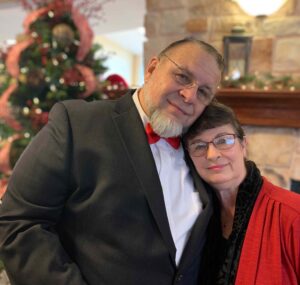Meet Kinney. This story and video are published with permission.
Kinney, a Bible professor and preacher, was diagnosed with rheumatoid arthritis (RA) around 2000 and later with Sjögren’s syndrome. It was a long journey. Reflecting on this period, Kinney recalls, “From the time I got RA till the time they said I had Sjögren’s, it was almost three years.”
Sjögren’s syndrome is an immune system disorder that can accompany other immune system disorders, such as RA and lupus. It most often occurs in adults over age 40. The mucous membranes and moisture-secreting glands of the eyes and mouth are usually affected first — resulting in decreased tears and saliva. (Source: Mayo Clinic )
Initial Symptoms and Struggles
The ocular symptoms associated with Sjögren’s syndrome began to significantly impact Kinney’s life. “When I would read, my eyes would lock on my close vision, and I couldn’t see far away,” he explained. Over time, his eyes worsened, leading to extreme pain and deteriorating vision, eventually forcing him to stop driving. Despite consulting various eye doctors in Abilene, Texas, and later in the Dallas-Fort Worth area, he found little relief. The prescribed treatments, including Restasis and eye drops made from his blood serum, also known as serum tears, offered minimal help. Even punctal cauterization of tear ducts provided no relief.
Turning Point: Discovery of PROSE
During a visit to an eye doctor in the Dallas-Fort Worth area “just as I was walking out the door of his office,” the doctor said, ‘’You might look online at Boston Foundation for Sight.” This suggestion marked a pivotal moment in his journey.
Experience with PROSE Treatment
The fitting and treatment process at the Boston Foundation for Sight (now known as BostonSight) was a stark contrast to his previous experiences. Kinney noted the attentiveness and understanding of the staff.
“They dimmed the lights in the exam room, and I thought, maybe these people understand how painful bright lights are for someone with bad eyes like me.”
He was particularly impressed by Dr. Karen Carrasquillo and her thorough explanation of the fitting process for the PROSE devices. The impact of the PROSE devices was immediate and profound.
“When they put the first lenses in, the pain went away. I thought at that moment we must be moving in the right direction.”
The lenses restored his vision and eliminated the constant pain he had endured for years.
Improvement in Quality of Life
Before using PROSE devices, Kinney’s quality of life was severely affected. He could no longer read or drive and was in constant pain. The lenses, however, changed everything.
“Now, I tell people I have my life back. I can read, I drive, I never have any pain,” he said.
This transformation extended to his professional life as well. As a preacher, he found it difficult to perform his duties due to eye pain and impaired vision. After PROSE treatment, he returned to a normal, pain-free life and could carry out his job responsibilities.
Daily Use and Comfort
Kinney wears his PROSE devices for about 15 to 16 hours a day, from when he wakes up until he goes to bed. He rarely needs to remove and reapply them during the day, except occasionally to clean the outside surface.
“Sometimes I’ll have to take them out and clean the outside surface of the lens because the oily part of the tears will get on the outside surface. But other than that, I don’t have to take them out for any reason.”
Advocacy and Recommendations
Kinney has strongly advocated PROSE treatment, recommending it to others with similar conditions. “I have recommended probably at least 50 people to come to you guys [BostonSight],” he said. His advocacy extends to social media platforms, where he engages with communities of individuals dealing with dry eye and Sjögren’s syndrome. Kinney’s journey from debilitating pain and vision loss to restored vision and a pain-free life highlights the importance of innovative treatments like PROSE and compassionate care. As he continues to share his positive experience, he hopes to help many others find the relief they desperately need.